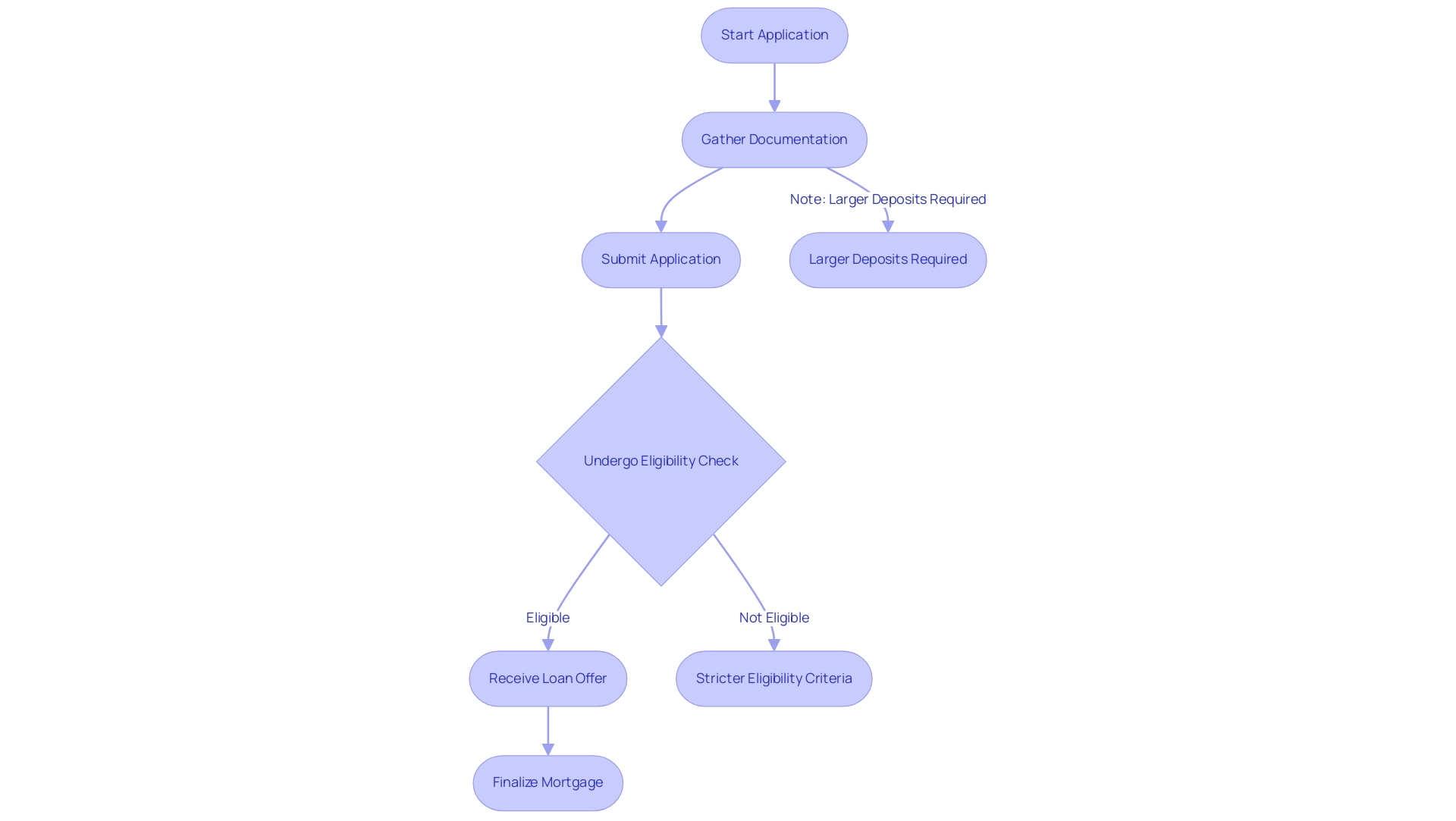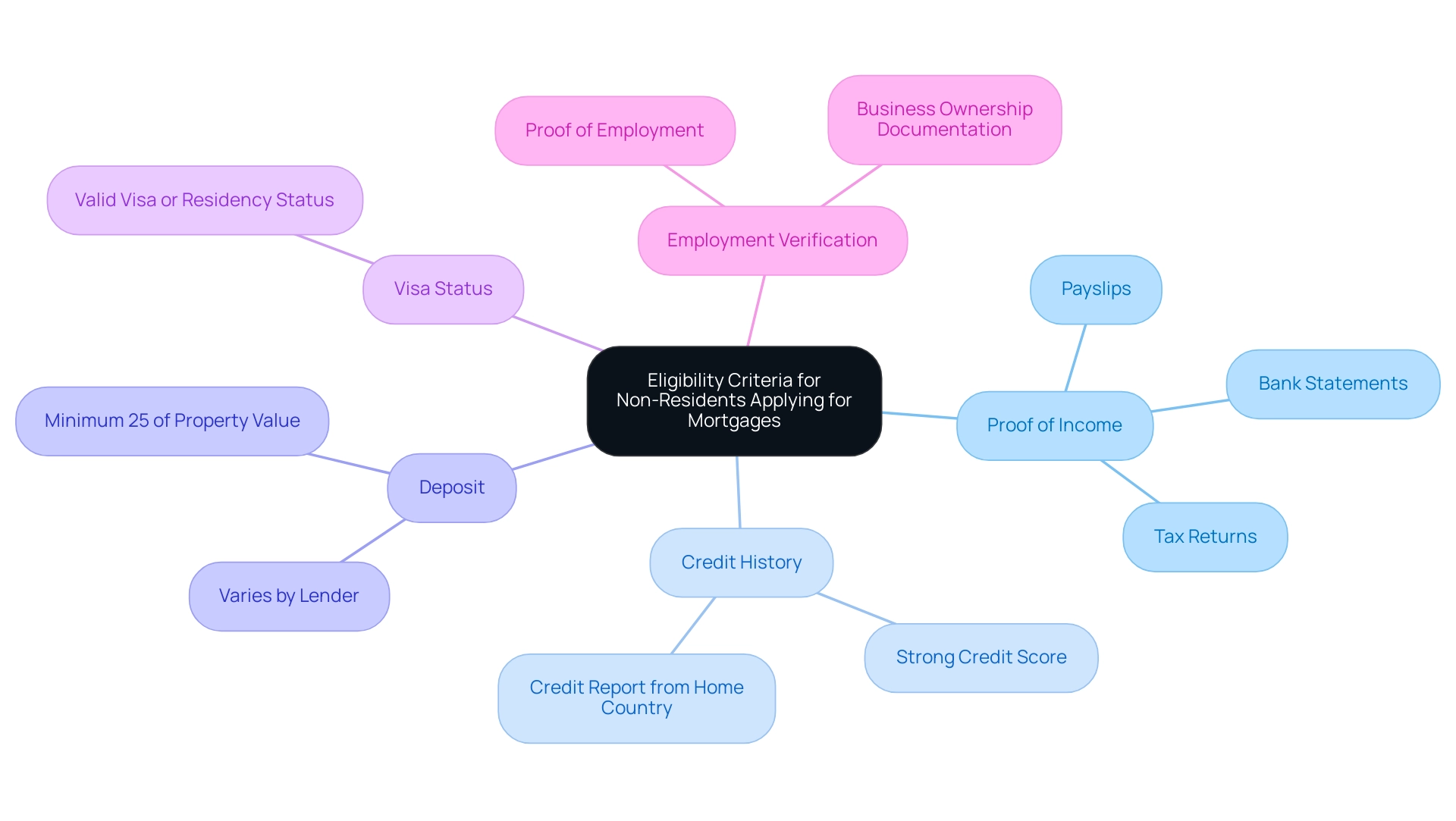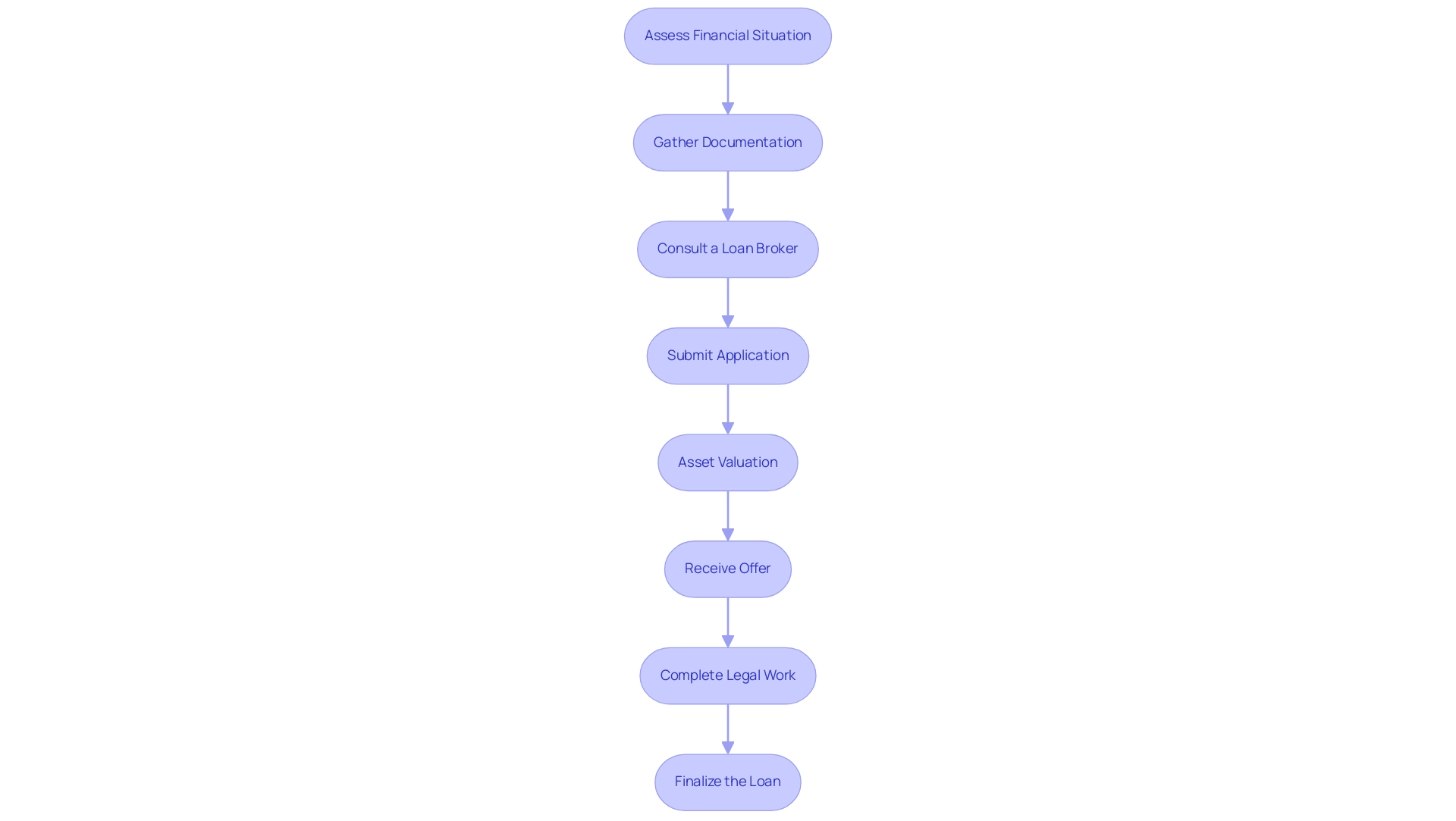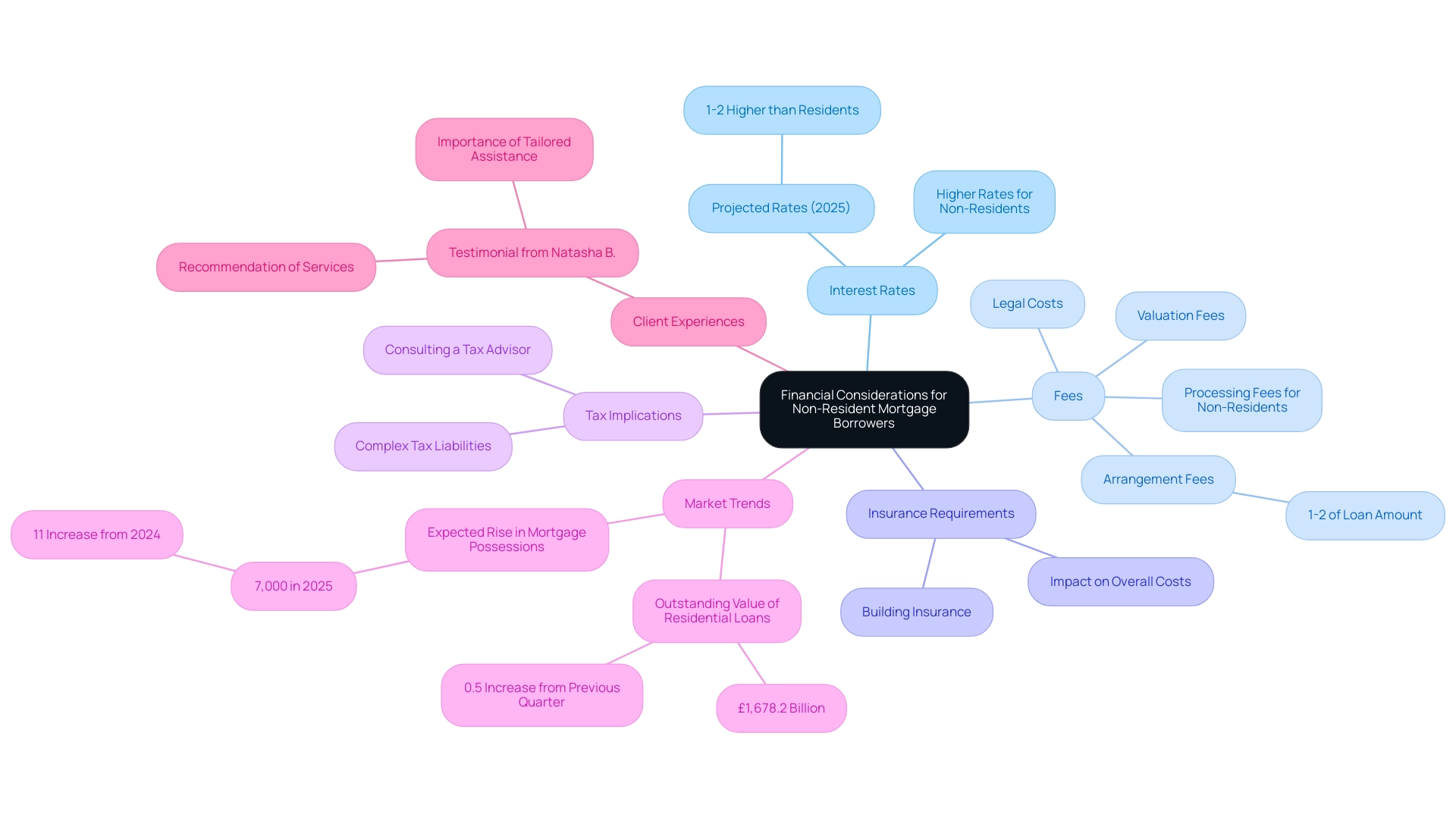Overview
Non-resident mortgages in the UK cater to individuals residing abroad who seek to invest in UK real estate. These mortgages typically necessitate larger deposits and impose stricter eligibility criteria than standard mortgages.
While these financial products present unique challenges—such as complex documentation and higher interest rates—successful navigation of the process is entirely attainable.
With the assistance of specialized brokers, investors gain tailored support and access to a broader range of lenders.
Are you ready to explore how these experts can simplify your investment journey?
Introduction
In a world where global mobility is increasingly prevalent, the appeal of investing in UK property from abroad is undeniable. Non-resident mortgages present a viable pathway for individuals living outside the UK—whether expatriates or foreign nationals—to access this lucrative market. However, the journey to securing such financing often presents unique challenges, including:
- Higher deposit requirements
- Complex eligibility criteria
Understanding these intricacies is crucial for non-residents seeking to make informed investment decisions. This article delves into the essential aspects of non-resident mortgages in the UK, exploring:
- The types available
- The application process
- The vital role of mortgage brokers in facilitating a smoother experience for international buyers.
Understanding Non-Resident Mortgages in the UK
Non-resident mortgages in the UK are specifically tailored for individuals living abroad who wish to invest in UK real estate. This category encompasses foreign nationals, expatriates, and those residing outside the UK. The application process for non-resident mortgages can differ significantly from that of standard mortgages, often necessitating additional documentation and a thorough understanding of the UK real estate market.
At Finance Story, we specialize in crafting customized residential investment solutions, ensuring that both first-time buyers and seasoned investors have access to optimal funding options.
A primary challenge faced by non-residents in securing these mortgages is the requirement for larger deposits, typically ranging from 25% to 40% of the property's value, in contrast to the standard 10% to 15% for residents. Moreover, non-residents may encounter stricter eligibility criteria, including heightened income verification standards and proof of financial stability. As of Q3 2025, approximately 7.2% of all UK home loans are projected to have a loan-to-value (LTV) ratio of 90% or higher, indicating a growing trend among buyers, albeit with increased risk.
Furthermore, recent changes in non-resident home loan regulations have reshaped the landscape. Lenders are now more cautious, influenced by rising interest rates and economic pressures, leading to a slight uptick in loan arrears. In Q1 2024, the total amount owed by UK homeowners in arrears reached £8.7 billion, with 110,150 homeowners struggling to maintain their payments.
This situation underscores the importance of comprehensive financial planning for non-residents aiming to enter the UK real estate sector. At Finance Story, we are committed to providing tailored funding solutions, such as non-resident mortgages, to help navigate these challenges.
Expert insights indicate that while opportunities abound, successfully navigating the complex realm of non-resident mortgages is crucial for those living abroad. A financing specialist remarked, 'Understanding the nuances of the UK loan market is essential for non-residents, as they face unique hurdles that can complicate the buying process.'
To secure a non-resident mortgage, applicants should be ready to furnish extensive documentation, including proof of income, tax returns, and bank statements. The average loan approval time typically ranges from two to six weeks; however, collaborating with an experienced broker at Finance Story can significantly expedite this process. Historically, UK home loans are most frequently approved between August and October, with all three months generally yielding around 67,000 approvals each.
Success stories abound, with numerous non-residents successfully acquiring real estate in the UK through non-resident mortgages. For instance, an Irish purchaser recently secured financing for a residential property in London, navigating the complexities with the assistance of a specialized broker at Finance Story who understood the unique challenges faced by non-residents. This case exemplifies that, despite the obstacles, with the right support and preparation, purchasing property in the UK is attainable for international buyers.
Additionally, survey data from Just Group reveals that the average age to settle a home loan in the UK is now 65, which may be pertinent for those considering non-resident mortgages for long-term investments.

Eligibility Criteria for Non-Residents Applying for Mortgages
To qualify for non-resident mortgages in the UK, applicants must navigate several essential criteria that ensure their financial stability and reliability. These include:
- Proof of Income: Non-residents are required to provide robust evidence of stable income. Acceptable documentation may include payslips, tax returns, or bank statements, which help lenders assess the applicant's financial situation.
- Credit History: A strong credit score is crucial for non-resident applicants. Lenders often request a credit report from the applicant's home country to evaluate their creditworthiness.
- Deposit: Typically, lenders mandate a minimum deposit of 25% of the property's value. However, this requirement can vary based on the lender's policies and the applicant's financial profile.
- Visa Status: Applicants must possess a valid visa or residency status in their home country, confirming their legal right to reside and work.
- Employment Verification: Demonstrating financial stability often necessitates proof of employment or business ownership. This verification reassures lenders of the applicant's ability to meet loan repayments.
In 2025, the landscape for non-resident mortgages in the UK continues to evolve, with expat mortgages accounting for approximately 15% of all mortgage applications. This trend underscores the growing interest among international buyers, particularly from Ireland and other countries, in investing in UK properties. Understanding these eligibility criteria is vital for accessing non-resident mortgages in this expanding segment of the market.
Recent case studies reveal that the total value of outstanding residential home loans in the UK reached £1,678.2 billion, reflecting a 0.5% increase from the previous quarter—the highest level since reporting began in 2007. This robust growth, with gross loan advances and new loan commitments both increasing by 4.9%, indicates a strong demand for financing, including for foreign applicants.
Expert insights indicate that comprehending the eligibility requirements is essential for foreign property loan applicants. Mortgage brokers emphasize the importance of maintaining a good credit score and having sufficient proof of income to enhance the chances of approval. As Jonathan Samuels, Chief Executive of Octane Capital, observes, 'the data comes from consultancy Savills,' emphasizing the importance of informed decision-making in this financial environment.
By meeting these criteria, applicants can successfully navigate the complexities of obtaining non-resident mortgages in the UK, paving the way for real estate investment opportunities. Additionally, investors can approach the brokerage for various investment plans, including rental opportunities and commercial space conversions, further expanding their options.

Types of Mortgages Available for Non-Residents
Non-resident mortgages in the UK provide access to a diverse array of financing options tailored to meet various needs and circumstances. The primary types include:
- Residential Mortgages: Ideal for individuals looking to purchase a home in the UK, these mortgages typically require evidence of earnings and a credit history, which may vary based on the lender's criteria.
- Buy-to-Let Loans: Specifically crafted for those intending to rent out their property, these loans often necessitate a larger deposit and may feature different interest rates compared to residential loans. Recent statistics indicate that non-resident mortgages in the UK are gaining popularity among non-residents, reflecting a growing interest in the UK real estate market.
- Expat Loans: Tailored for British citizens living abroad, these loans facilitate investment in UK real estate. They often consider foreign income and may have distinct requirements compared to standard residential loans.
- Commercial Loans: For non-residents aiming to invest in commercial properties—such as warehouses, retail spaces, factories, or hospitality ventures—these loans provide essential funding. They generally involve more complex assessments, including business plans and projected income. Finance Story specializes in crafting polished and highly individualized business cases for presentation to lenders, ensuring borrowers secure the right financing for their commercial investments. Additionally, Finance Story offers access to a comprehensive range of lenders, including high street banks and innovative private lending panels, to accommodate diverse financing needs.
Each loan type comes with its own set of requirements and conditions, making it imperative for borrowers to engage with a knowledgeable loan broker. This engagement ensures effective navigation through the complexities of the UK housing finance landscape. Expert insights reveal that understanding the nuances of each option can significantly impact the success of securing a loan, particularly in an environment where the average loan debt was approximately £150,719 as of March 2024.
Furthermore, predictions suggest that by Q3 2025, around 7.2% of all UK loans may feature a loan-to-value (LTV) ratio of 90% or more. It is essential for those seeking non-resident mortgages in the UK to stay informed about trends and lending standards. Consulting with experts like Finance Story can provide valuable guidance, especially for individuals considering buy-to-let investments, where understanding the economic dynamics is crucial for making informed financial decisions. The average number of monthly home loan approvals in the UK stands at around 67,000, underscoring the active market environment.
A recent quote from Just Group highlighted that a further third (32%) of borrowers had to extend their loans to finance home improvements, illustrating current trends and borrower behavior. Lastly, predictions indicate that loan rates may decrease in 2024, potentially influencing decisions regarding non-resident mortgages in the UK for non-residents. Moreover, refinancing options are available for those looking to adjust their existing loans to better suit their evolving business needs.
Step-by-Step Guide to Applying for a Non-Resident Mortgage
Applying for non-resident mortgages in the UK requires careful planning and a clear understanding of the process. Here’s a step-by-step guide to help you navigate this journey:
- Assess Financial Situation: Begin by evaluating your financial health. This includes a thorough review of your income, expenses, and credit score, which will help determine your borrowing capacity. Lenders typically assess affordability by examining your financial profile, so having a clear picture is essential.
- Gather Documentation: Compile all necessary documents that lenders will require. This includes proof of income, credit history, identification, and any other relevant financial statements. Being organized can streamline the application process significantly.
- Consult a Loan Broker: Engaging with a loan broker who specializes in non-resident loans is crucial. They can offer insights into the various options available, including unique opportunities such as buy-to-let loans for expatriates, and assist you in obtaining pre-approval, which can enhance your negotiating power when making an offer on real estate.
- Submit Application: Once you have all your documentation in order, complete the mortgage application. Ensure that all required information is accurate and comprehensive to avoid delays.
- Asset Valuation: After submitting your application, the lender will arrange for an assessment of the asset you wish to purchase. This step is essential as it helps the lender evaluate the market value of the asset and determine the loan amount.
- Receive Offer: If your application is approved, you will obtain a loan offer outlining the terms and conditions of the agreement. Review this document carefully to understand your obligations and the costs involved.
- Complete Legal Work: Engage a solicitor to manage the legal aspects of the real estate purchase. This includes conducting searches, handling contracts, and ensuring that all legal requirements are met.
- Finalize the Loan: The final step involves signing the loan agreement and completing the purchase of the property. At this stage, be prepared for any associated fees, such as booking fees, arrangement fees, and valuation fees, which can impact your overall budget. Understanding the fees associated with UK loan applications is crucial; applicants should be aware of potential costs to budget effectively and avoid unexpected expenses.
Understanding the average duration required to obtain non-resident mortgages in the UK can also assist in establishing realistic expectations. Typically, the process can take several weeks, depending on the lender and the complexity of your application. By adhering to these steps and preparing thoroughly, you can improve your prospects of a successful loan application for non-resident mortgages in the UK, which will open the door for your investment in the UK real estate sector.
To further assist you in this journey, we invite you to Book YOUR Initial CHAT and schedule your free personalized consultation with Finance Story's Head of Funding Solutions, Shane Duffy. Discuss your needs and goals, and let us start working with you to create your next chapter. Please select from our live calendar for a time that suits you.
As one satisfied client, Natasha B., remarked, "I will definitely be recommending your business to anyone. We are finished with the constant worry. Once again, thank you so much for being a part of our journey.

Challenges Faced by Non-Residents in Securing Mortgages
Non-residents seeking non-resident mortgages in the UK often encounter a myriad of challenges that complicate their application process. Key obstacles include:
- Higher Deposit Requirements: Many lenders impose stricter conditions on non-residents, typically requiring deposits that start at 25%. This higher threshold can be a significant barrier for potential buyers, particularly those unfamiliar with the UK property market.
- Limited Lender Options: The pool of lenders willing to offer non-resident mortgages in the UK is relatively small. In fact, 17% of brokers report finding it 'extremely challenging' to locate suitable financial products for high-net-worth individuals (HNWIs) and ultra-HNWIs. This limitation can restrict borrowers' choices, making it essential to work with a knowledgeable broker who can navigate the available options effectively.
- Complex Documentation: The application process for non-residents often demands extensive documentation, including proof of income, credit history, and identification. This complexity can lead to delays and confusion, underscoring the importance of thorough preparation.
- Currency Fluctuations: Non-residents must also consider the impact of currency exchange rates on their loan affordability and repayments. Fluctuations can significantly change the cost of a loan, making it crucial for borrowers to stay informed about market conditions.
- Legal and Tax Implications: Owning property in the UK as a non-resident comes with various legal and tax considerations that can be daunting. Understanding these implications is vital to avoid unexpected liabilities and ensure compliance with UK regulations.
Despite these challenges, many non-residents successfully navigate the financing landscape, particularly regarding non-resident mortgages in the UK, with the support of Finance Story. Speaking to us about your next home loan is as easy as 1, 2, 3. We save you time and handle the hard work to find the best value products on the market.
By maintaining a UK bank account, preparing comprehensive documentation, collaborating with a specialist broker, and enhancing their credit score, applicants can significantly improve their chances of obtaining financing. Implementing these strategies, especially with the personalized guidance from Finance Story, can strengthen an applicant's loan application for non-resident mortgages in the UK and increase the likelihood of approval. A case study titled "Strategies for Securing an Expat Mortgage" illustrates that these approaches can lead to successful outcomes.
Expert insights reveal that as the landscape for expat home loans continues to evolve, staying informed about market conditions and lending statistics remains crucial for those considering non-resident mortgages in the UK to invest in property. As one satisfied client, Natasha B., remarked, "I will definitely be recommending your business to anyone. We are finished with the constant worry. Once again, thank you so much for being a part of our journey." This highlights Finance Story's commitment to building strong, long-term relationships with clients, ensuring they feel understood and supported in their financial decisions. We can meet with you at a time that suits your busy life, reinforcing our dedication to providing flexible and comprehensive service.
The Role of Mortgage Brokers in Assisting Non-Residents
Loan brokers play a crucial role in facilitating overseas home loans in the UK, providing a variety of essential services that address the specific requirements of international purchasers. Their contributions can be summarized as follows:
- Providing Expert Advice: Brokers possess a deep understanding of the complexities surrounding non-resident loans. They offer tailored advice that considers the specific circumstances of each client, ensuring that potential borrowers are well-informed about their options. Finance Story, for example, is recognized for its customized loan services that help clients navigate their financing journeys, establishing them as a reliable partner in this process.
- Accessing a Wider Range of Lenders: With established connections to a diverse array of lenders, including boutique lenders, private investors, and mainstream banks, brokers significantly enhance the likelihood of securing suitable loan options. This access is particularly beneficial in a market where mainstream lenders often impose stringent criteria. Finance Story's comprehensive panel of lenders ensures that clients have all the options available to discuss, allowing them to find tailored solutions that meet their specific needs.
- Streamlining the Application Process: The loan application process can be daunting, especially for non-residents unfamiliar with non-resident mortgages in the UK. Brokers assist by organizing necessary documentation and guiding clients through each step, thereby simplifying what can often be a complex procedure. This support is crucial for clients who want to invest in UK real estate with confidence, as highlighted by satisfied customers like Natasha B, who expressed gratitude for the assistance received throughout their journey. Finance Story provides step-by-step guidance, ensuring that clients understand each phase of the application process.
- Negotiating Terms: Brokers are skilled negotiators who advocate on behalf of their clients. They strive to obtain advantageous terms and rates, which can result in substantial savings throughout the duration of the loan. This capability is crucial in a competitive environment where even minor differences in rates can have substantial financial implications. Finance Story's expertise in understanding business needs allows them to negotiate effectively on behalf of their clients.
Statistics underscore the effectiveness of loan brokers in this sector. Recent data indicates that the total value of outstanding residential loans in the UK reached £1,678.2 billion, reflecting robust growth in the lending market. This growth is accompanied by a 4.9% increase in new loan commitments, suggesting a strong demand for non-resident mortgages in the UK, particularly among non-residents.
Case studies further illustrate the success of loan brokers in assisting non-residents with non-resident mortgages in the UK. For instance, partnerships between brokers and international clients have led to streamlined processes and successful loan approvals, showcasing the brokers' ability to navigate the complexities of the UK housing finance landscape effectively. Finance Story's dedication to client satisfaction is clear in the favorable experiences recounted by clients, enhancing their standing as a top lending brokerage.
In summary, the advantages of using a lending broker for overseas property loans in the UK are numerous. From expert guidance and access to a broader range of lenders to efficient application management and effective negotiation, brokers are invaluable allies for international buyers looking to invest in UK real estate. The challenges faced by brokers due to mainstream lenders' rigid lending criteria further highlight the necessity of their services in the current market landscape.
Financial Considerations for Non-Resident Mortgage Borrowers
When considering a non-resident mortgage, borrowers should be aware of several critical financial implications that can significantly impact their overall investment strategy.
- Interest Rates: Non-residents typically encounter higher interest rates compared to their resident counterparts. This is primarily due to the perceived risk associated with lending to individuals who do not reside in the country. As of 2025, average interest rates for non-resident mortgages in the UK are projected to reflect this trend, with rates expected to be approximately 1-2% higher than those available to residents.
- Fees: Borrowers should also anticipate additional fees that can accumulate throughout the mortgage process. Common charges include arrangement fees, which can range from 1% to 2% of the loan amount, valuation fees that evaluate the asset's worth, and legal costs associated with the transaction. Understanding these fees upfront is crucial for effective financial planning. For instance, some lenders may charge specific fees for processing non-resident applications, which can vary significantly.
- Insurance Requirements: Lenders often mandate specific insurance policies, such as building insurance, to protect their investment. This requirement can increase the overall costs of securing a mortgage, making it essential for borrowers to consider these expenses when budgeting for their acquisition.
- Tax Implications: Non-residents must navigate the complexities of tax liabilities associated with real estate ownership in the UK. Consulting with a tax advisor is highly recommended to ensure compliance with local regulations and to understand any potential tax obligations that may arise from property income or capital gains.
- Market Trends: Recent data indicates a robust growth in the UK loan lending sector, with the outstanding value of residential loans reaching £1,678.2 billion, marking a 0.5% increase from the previous quarter. This trend indicates a strong need for loan financing, especially pertinent for overseas borrowers seeking non-resident mortgages in the UK to enter the market. Additionally, property possessions are expected to rise to 7,000 in 2025, an increase of 11% from 2024, highlighting the growing interest in non-resident mortgages in the UK.
- Client Experiences: As noted by a satisfied client, Natasha B., "I will definitely be recommending your business to anyone. We are finished with the constant worry. Once again, thank you so much for being a part of our journey." This highlights the significance of tailored assistance in navigating the financing process. Speaking to Finance Story about your next home loan is as easy as 1,2,3. Save yourself the time and let us do all the hard work to find the very best value products on the market. We can meet with you at a time to suit your busy life and establish what is important to you about your next home loan.
By being aware of these financial considerations, non-resident borrowers can make informed decisions and effectively navigate the complexities of securing non-resident mortgages in the UK. Brokers are encouraged to seek tailored solutions from lenders to help clients access mortgage finance confidently.

Conclusion
Investing in UK property as a non-resident presents a wealth of opportunities, yet it is accompanied by distinct challenges. This article has outlined the various types of non-resident mortgages available—residential, buy-to-let, expat, and commercial—each tailored to specific investment goals. It is essential for potential borrowers to understand the eligibility criteria, including proof of income, credit history, and the necessity for higher deposit requirements, as they navigate the complexities of the UK mortgage landscape.
The application process may appear daunting; however, adopting a structured approach—assessing financial situations, gathering necessary documentation, and consulting with experienced mortgage brokers—can significantly enhance the likelihood of success. Mortgage brokers are crucial allies, offering expert advice, accessing a broader range of lenders, and streamlining the application process, making them invaluable for international buyers.
Ultimately, while the journey to securing a non-resident mortgage may be fraught with hurdles, it is navigable with the right preparation and support. By being informed about financial implications and market trends, and by utilizing the expertise of mortgage brokers, non-residents can make well-informed investment decisions that facilitate successful property ownership in the UK. With appropriate guidance, the aspiration of owning property in this vibrant market can indeed become a reality.




